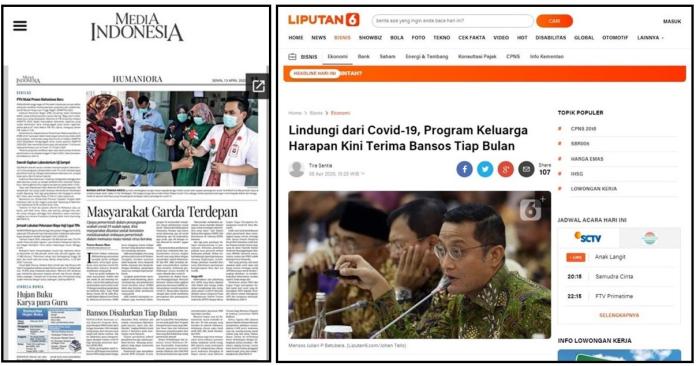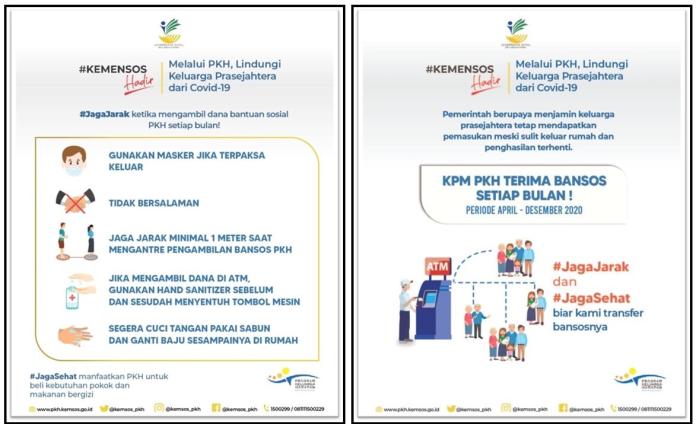Keeping Indonesia’s low-income households protected and informed amid the Covid-19 crisis
Designing campaign communications and outreach for the Indonesia's flagship cash transfer programme.
-
Date
April 2020
-
OfficeOPM Indonesia
Click here to read in Bahasa Indonesia
The Asian Development Bank approved the technical assistance to support the expansion of the Family Hope Program. As part of this program, OPML works with the Ministry of Social Affairs and the Directorate of Family Social Security, developing the capacity of staff across central, provincial, and district levels in communication, advocacy, utilisation of social media and program data.
COVID-19 pandemic in Indonesia
With the COVID-19 outbreak affecting all countries around the world, at the time of writing Indonesia has recorded 9,511 COVID-19 cases with 773 deaths - the highest in Southeast Asia. The pandemic has affected all 34 provinces in Indonesia with more than half of the COVID-19 cases and death concentrated in the capital Jakarta and surrounding area.
Government’s immediate actions to combat the pandemic
To curb the spread of the outbreak, the government has implemented physical distancing measures and limited activities in public places. And has recently declared the outbreak as a national emergency, enacting further large-scale social restrictions.
The COVID-19 crisis and the measures introduced to tackle its containment have severely impacted social and economic activities; informal sector workers and low-income Indonesian households being the hardest hit due to their reduced income.
Government tops up budget for social safety net programs to protect the poor
To soften the economic impact from COVID-19 on low-income Indonesian households, the government has committed IDR 110 trillion (US$7.68 billion) for various social safety net programs. These include the expansion of the Family Hope Program (PKH), the country’s flagship conditional cash transfer programme that is distributed across all provinces in Indonesia reaching more than 10 million beneficiary households.
The Challenge: Getting information across to all new and prospective beneficiaries
The COVID-19 crisis has begun to impact the social and economic welfare of low-income households, including the Family Hope Program beneficiaries. The lead ministry - the Ministry of Social Affairs – moved quickly to adjust the delivery of the program and to share information on the government’s COVID-19 response. The ministry has changed the benefit payment cycle, making payments monthly, instead of quarterly; increased budget allocation and the number of beneficiaries, and urged physical distancing measure when withdrawing benefits.
The Response: OPML is developing communication tools to spread prevention messages
Through the Building Inclusive Social Assistance (BISA) program, OPML has pivoted its support to the Indonesian government to develop communication products to inform beneficiaries of the changes to their benefit payments and on how to minimise the spread of the virus.
We developed a central narrative of the Ministry’s commitment to maintaining support for the Family Hope Program beneficiaries, providing security to families. This central narrative will be embedded across all communication products. We also developed four campaigns to inform program beneficiaries of the main actions to take to reduce exposure to COVID-19: #dirumahaja (stay at home), #jagajarak (maintain distance), #jagasehat (stay healthy), and #janganmudik (avoid holiday exodus).
We designed several campaign products and disseminated across a variety of channels and platforms to reach key audiences: a Fact Sheet was produced; SMS texts (SMS Blast) were sent across mobile networks delivering a single key message on changes of the Family Hope Program delivery and response; an online Press conference briefing was organised with the Minister of Social Affairs; and Radio Interviews were organised. Examples of these campaign products are below.
- Press release – distributed to various media outlets, both print and online, including national and regional media (e.g. Media Indonesia, Java Post, and Liputan6).

- E-poster – distributed through media social accounts of Family Hope Program and Ministry of Social Affairs, as well as through WhatsApp Groups and Telegram chats

- Video Tutorial – distributed through social media accounts of the Ministry of Social Affairs, Family Hope Program, Ministry of Communication and Information, etc. to ensure a more interactive and easy-to-understand messages to program beneficiaries.
The number of COVID-19 cases in Indonesia continues to rise with little sign of slowing down as the government ramps up rapid tests in all provinces. In a fluid situation like this, ensuring effective communication and maintaining social assistance is imperative to minimise the impact of COVID-19 crisis on low-income households.
The challenges ahead…
The demand to expand Family Hope Program beneficiaries as a response to the outbreak has created challenges in the identification of new beneficiaries. Verification and validation processes tend to be lengthy and administratively burdensome. The demand to stay at home hampers the processes that usually involves face-to-face meetings. To tackle this problem, the ministry has requested participation from local governments to assist validation processes in their respective areas, ensuring that all affected groups are protected under the social assistance program.
The next challenge will be how the government relaxes the lock down measures and how this is communicated adequately to citizens. Moving from stringent antisocial behaviours, to a gradual and integrated resumption of normal life will be an acute communication challenge for governments globally.
